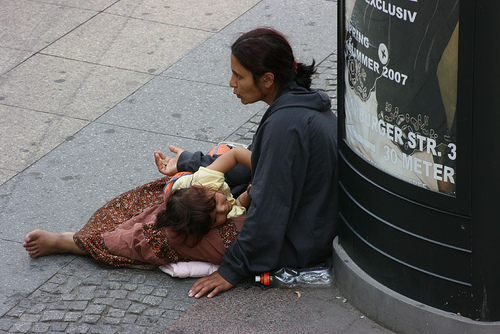Romania through common stereotypes: vampires, Roma people, communism. What else?

 For many foreigners, Romania is the equivalent of a series of common misconceptions. Things that just pop into one's mind when hearing about the country. This week, we're looking at stereotypes and how they can affect communication. We're looking forward to receiving your thoughts on this: what was the first thing that came to mind before you had the chance to discover the real Romania and its people?
For many foreigners, Romania is the equivalent of a series of common misconceptions. Things that just pop into one's mind when hearing about the country. This week, we're looking at stereotypes and how they can affect communication. We're looking forward to receiving your thoughts on this: what was the first thing that came to mind before you had the chance to discover the real Romania and its people?
By Irina Budrina
Let's first clarify four of the most common stereotypes foreigners have about Romania. Some of them, such as the Roma information, may be hard to believe when thinking back at the recent campaign against the Romanian-born Roma in France, for example. That certainly didn't help with clarifying the misconception!
1. There are no vampires in Transylvania. Also, there’s nothing creepy about it and people living there don’t have that funny accent you’ve heard in Hollywood films.
2. Romanians don’t speak Russian, Romanian is a Romance language. People were forced to learn Russian during communism but this was not the case since 1990.
3. Roma people make up only 2.5% of Romania’s over 22 million people. A surprising number of people seem to think Romanians are the minority. Which is not to say that Roma are not Romanians.
4. Bucharest is Romania’s capital city, while Budapest is actually Hungary’s. This is something that many people get wrong.
For more than forty years, Romanians lived under a regime that discouraged contact with foreigners. At a first meeting, Romanians approach foreigners typically with the expectation that people from other cultures will take on their own (stereotypical) national identity. For example, on a scale, Canadians are supposed to be less aggressive than Americans, but not as direct as the French.
The ideological and legal barriers that once stood in Romania no longer exist and people are open to making contact with foreigners. There are no taboo subjects, but foreigners will quickly note that people are more interested in talking about topics that touch their lives (such as personal, political, economic, or international situations) than talking about new subjects. Talking about work and asking where people come from are good ice-breakers, as is talking about the weather.
My Canadian friend shared some of his experience in Romania. And I would like to share it with you:
“I found that discussion topics Romanians I met were most interested in include where you are from, your family background (e.g. are you married, do you have children), what you are doing in Romania and what you think of Romania. On the latter point, I found the Romanians I spoke with were proud of their country, culture and history and would appreciate an honest but positive assessment of it.
When speaking with Romanians of European background, I found touchy subjects to include the Roma people (so-called Gypsies). My experience was that European Romanians and the Roma have a difficult relationship. I often found that European Romanian friends and colleagues were aggressive and defensive towards any Roma who might approach me or other expatriates in their company.
Another potentially touchy subject for Romanians I came across was the Communist era. My experience was that younger Romanians want to move with certainty into a capitalist system and admired things "modern and Western" - albeit sometimes ambivalently. The older generation I found tended to recall the security of jobs and life that Communism offered.
While I often heard Romanians themselves sharply criticize Communism, I felt that this was a case of insider criticism being more acceptable than that of outsiders.
What leads to stereotyping?
Stereotypes are a more rigid form of generalisation and contain an element of judgement in them. Stereotyping means fixing a set of ideas about what a particular nationality is like, which is (wrongly) believed to be true in all the cases:
• the Chinese are hardworking/resilient
• Germans are well organised
• Italians are temperamental/passionate/ touchy
• Latin people are lazy
• the English are well mannered/ have an excellent sense of humour
• Americans are outgoing/friendly/ materialistic
• the Swiss are trustworthy
• the French are hedonistic/amorous
• people of colour are musical
• Arabs are excitable.
Stereotypes are usually based on exaggeration, distortion, ignorance, racism, cultural factors and historical experiences. Stereotyping is a negative, inadequate way of seeing people. Harmful stereotypes are retained unconsciously, are judgmental and not descriptive, could be accurate, but are often not and are not modified by experience.
Their aim is dividing, separating people between “them” and “us”. They are a result of irritation because our implicit values, those we cannot explain and we have learned unconsciously without ever questioning them, are being challenged. They do not consider individual and intracultural differences. They arise from the belief that culture is a barrier that we cannot overcome. They hide the intention of making the other culture accept my standards because they are better. In intercultural communication, cultural generalizations are used as a shorthand way to make non-judgmental cross-cultural comparisons, not to oversimplify or deny the complexity of social interaction.
All people use stereotypes, but some people are more aware than others that the stereotypes they are used should be open to modification. Some people refuse to let stereotypes even when confronted with overwhelming evidence of challenges and undermines the stereotypes they hold. We have to ask ourselves why this is the case.
If we can understand what function, or need negative stereotypes meet and then we can find a solution how to feel safer, easier, less frightening, more face saving. Then, perhaps, we can challenge negative stereotyping in ourselves, and others, more effectively.
Stereotypes can support basic feelings of self-esteem and even a need to feel superior. If you consider that you have grown up in a society that practices ‘proper’ behavior then you can look down on other cultures (or social classes within your own culture) who do not meet your ‘standards’. Maybe your acceptance into one group is dependent upon your rejection of members of another group.
Generalisations are helpful to the extent that they are used only as guides, not as infallible recipes, or absolute truths. People’s ethnic origin does not tell us exactly where they fit in terms of values or behaviours but it may alert us to possible areas of misunderstanding/miscommunication. Instead of relying on stereotypes, we should determine where each individual fits on a continuum of values, compared to his/her ethnic group.
We'd love to hear from you stories about situations when you found yourself using stereotypes about Romanians (or any other nation) and how the communication went. What other stereotypes have you heard about Romanians? Feel free to comment below or send an e-mail to irina-budrina [at] hotmail.com.
More about the author on this article on our editorial team page.
Article by Irina Budrina, editing by Corina Saceanu











